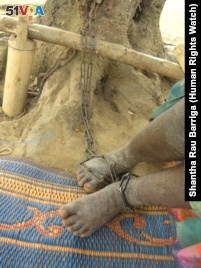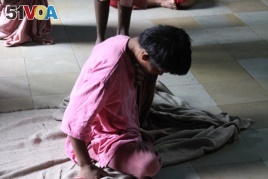18 April, 2016
From VOA Learning English, this is the Health & Lifestyle report.
A new report from Human Rights Watch details the treatment of mentally sick people in Indonesia. The report is titled "Living in Hell." It documents the practice of "pasung."
Pasung is the isolation of a person suffering from some sort of mental health problem. They might be held separate from others, either inside or outside their homes or at a health care center. Sometimes they are held in place with tied ropes or chains. The situation forces the person in pasung to eat, sleep and release waste in one small place.
The report says about 18,000 people currently live in pasung in Indonesia.

Victoria is a 10-year-old girl with a mental disability who was put in Jesus Divine Temple (Nyakumasi) Prayer Camp, where she was chained to a tree all day and slept on a mat in an open compound. She had no relative present at the camp at the time Human Rights Watch visited. Victoria had a skin infection which had affected her whole body, but she was not given access to medical treatment for this disorder. (2012 Shantha Rau Barriga/Human Rights Watch)
The report also cites one case in which a man was trapped in a room for 15 years. Another case involved a 24-year old woman suffering from depression after her husband left her and her small child. Photos show her chained to a wooden platform that serves as a bed.
Shantha Rau Barriga is the director of the disability rights division at Human Rights Watch in Jakarta. She spoke to VOA by phone.
Barriga says that Human Rights Watch has documented rights abuses against the mentally sick in many countries. These abuses often include chaining or tying people in place.
She adds that such cases can be found at mental health centers in Ghana, Russia, Croatia, as well as in prisons in the United States.

A resident sits on the floor of a mental hospital in the suburbs of Mumbai, India. (PHOTO/2013 Shantha Rau Barriga/Human Rights Watch)
Barriga warns that abuse is widespread. She says the victims seem "invisible" because they are held in isolation.
The expert says stigma connected to mental health problems worsens the situation. She also said that there are not enough community-based mental health care and support services.
Barriga said there "is so much misinformation and misperception about mental health." In her words, "people in Indonesia, and in many other countries, see it not as a medical condition, but as a curse, or that the person is possessed by evil spirits."
As a result, people may turn to spiritual healers or prayer for a "cure." They may choose not to use medical care even if it is available.
Superstitions: "She's a witch"
Barriga traveled to Ghana in 2014 to study conditions at so-called "prayer camps."
Christian organizations own the camps. The camp leaders often declare themselves to be "prophets."
People go to the camps for help, she explains, during difficult times in their lives, after a death in the family, for example, or the loss of a job.
But the camps also contain separate areas for people with mental and intellectual problems. They are often brought to the camp against their will and left for long periods of time. A 2012 Human Rights Watch report described a man tied to a tree for five years.
Barriga was interviewing the head of one such camp when she heard a child crying. She asked who it was. The man told her the child crying was a "witch." He took Barriga to see her. Barriga said she was a five-year-old girl chained to a tree.
According to Barriga, the camp leader told her about 95 percent of the so-called witches at the camp are girls. Barriga then claimed that the man pointed to a group of girls, from about ages five to 11, saying, "She's a witch. She's a witch. She's a witch."
Multiple treaties violated
The United Nations adopted the Convention on the Rights of Persons with Disabilities in late 2006. It calls on countries to support, protect and guarantee full human rights and freedoms for all persons with long-term disabilities.
More than 160 countries have signed the treaty. Barriga said shackling and other abuse of the mentally ill violates this treaty and others.
Indonesia banned the use of pasung almost 40 years ago. However, Barriga says the government needs to do more to stop pasung.
Human Rights Watch is calling on Indonesia to enforce the ban by closely watching centers where it takes place. The organization is also urging Indonesia to work toward changing opinions about mental sickness among communities.
Shantha Rau Barriga said the long-term goal is for governments all around the world to change how they treat the mentally ill.
She said she hopes governments turn toward a "system of community-based mental health care, where people can live independently, make decisions for themselves and get the care services they might want."
Studies have shown that in any given year, as much as a third of the world's population suffers some form of a mental disorder. Two-thirds of them do not get the care they need and are at risk of abuse.
I'm Anna Matteo.
And I'm Jonathan Evans.
Cecily Hilleary wrote this story for VOA News. Anna Matteo adapted it for Learning English. Caty Weaver was the editor.
_____________________________________________________________
Words in This Story
isolation – n. the state of being in a place or situation that is separate from others
shackle – n. one of two rings that are placed around a person's wrists or ankles and that are connected by a chain
invisible – adj. incapable by nature of being seen
stigma – n. a set of negative and often unfair beliefs that a society or group of people have about something
superstition – n. a belief or way of behaving that is based on fear of the unknown and faith in magic or luck
witch – n. one that is credited with usually malignant supernatural powers